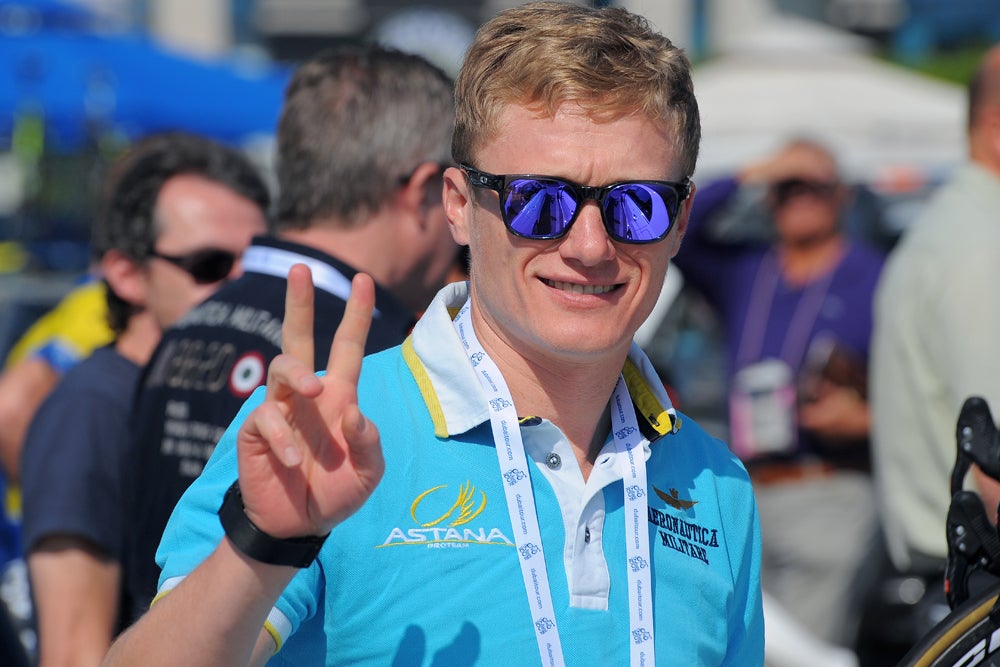Report: Padua inquiry shelved, Ferrari to sue?

Alexandre Vinokourov and several other current and former riders could be off the hook in the Padua doping inquiry. Photo: Tim De Waele | <a href="http://www.tdwsport.com" target="_blank" rel="noopener noreferrer">TDWsport.com</a>
MILAN (VN) — The Padua inquiry and its 550 pages of evidence centered on the workings of Michele Ferrari will be shelved, according to a new report. The infamous doping doctor who helped Lance Armstrong may follow by suing for damages.
According to an article in Italy’s Corriere della Sera newspaper Friday morning, the public prosecutors in the country’s northeastern city will not see any bans, fines, or sentences based on their findings presented eight months ago.
Those Ferrari clients who already were suspended — Filippo Pozzato, Michele Scarponi, and Giovanni Visconti — could appeal if the case is closed without action.
“In November, the regional court in Lazio will look at my appeal,” Ferrari told the daily newspaper. “I’ve also asked for damages.”
Ferrari, known as “Dr. Evil” to some, continues to serve a lifetime suspension from working in sport after the U.S. Anti-Doping Agency (USADA) investigation in 2012 revealed the depth of his input into Armstrong’s doping regime.
“I’m in pension, I don’t give a shit about training,” Ferrari said. “They are all strong without me. Did you see the Tour de France?”
Eight months ago, the 550 pages made their way from the university city of Padua to the capital in Rome, where the Italian Olympic Committee (CONI) has its headquarters. The evidence focused on Ferrari and his clients between 2010 and 2011.
The names included Astana’s general manager Alexandre Vinokourov, 2009 Giro d’Italia winner Denis Menchov, and Roman Kreuziger, the latter who wrestled with a biological passport case this year. Menchov, according to the evidence, paid Ferrari 50,000 euros a year for his services.
Race walker Alex Schwazer is featured in the evidence, along with 38 cyclists: Leonardo Bertagnolli, Simone Boifava, Diego Caccia, Enrico Franzoi, Marco Frapporti, Omar Lombardi, Fabrizio Macchi, Marco Marcato, Andrea Masciarelli, Francesco Masciarelli, Simone Masciarelli, Daniele Pietropolli, Morris Possoni, Filippo Pozzato, Alessandro Proni, Michele Scarponi, Francesco Tizza, Giovanni Visconti, Ricardo Pichetta, Andrea Vaccher, Mauricio Ardila, Volodymyr Bileka, Borut Bozic, Maxim Gourov, Vladimir Gusev, Valentin Iglinskiy, Sergei Ivanov, Vladimir Karpets, Aleksander Kolobnev, Dimitri Kozontchuk, Roman Kreuziger, Denis Menchov, Evgeni Petrov, Yaroslav Popovych, José Rojas, Ivan Rovny, Egor Silin, and Alexandre Vinokourov.
A large number of Astana cyclists — 17 when counting former and current members — popped up, including Vinokourov.
Along with its five doping cases from 2014 — two from the professional team — the pages threatened to derail Astana. The UCI pushed for its license committee to use the files while it reviewed the team’s license last winter. Ultimately, the team received its license to race in the WorldTour in April, based on special conditions. The team continues to race with Vinokourov at the helm.
The Olympic Committee in Rome has its own problems. The UCI set up an international tribunal in 2014 to handle doping cases. No longer would doubts linger about some country’s turning their heads or giving soft bans, but it meant that Italy’s committee could no longer act quickly after reading legal files.
The Padua files could result in some criminal cases, but such action would take even more time. What started as a big bang in cycling eight months ago is instead coming to a quiet ending.